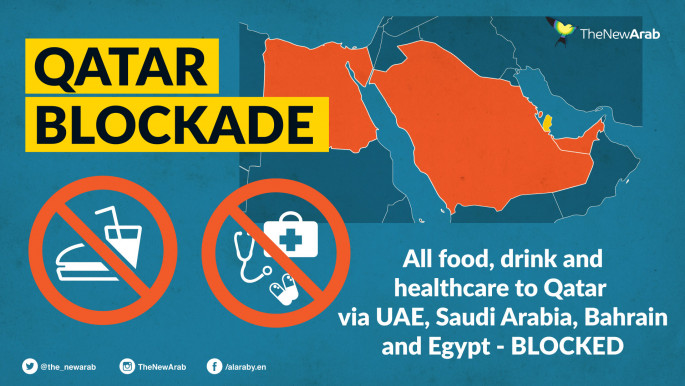Sanctions on Qatar are backfiring… as sanctions usually do
Six weeks into the punitive Saudi-led blockade of the tiny nation of Qatar, there are already signs it is backfiring for the perpetrators - an unsurprising fact in light of the many historical precedents of blockades and sanctions regimes in the region.
After Iraqi dictator Saddam Hussein invaded and annexed Kuwait in August 1990, Iraq was subjected to international sanctions by the United Nations Security Council. An enormous technologically advanced US-led military coalition subsequently forced Saddam out of Kuwait early the following year, devastating much of Iraq in the process.
The dictator remained in power and the sanctions remained in place until his overthrow in 2003 following another devastating US-led invasion.
The sanctions on Iraq hurt the Iraqi people much more than they hurt the regime. Saddam used the suffering of innocent Iraqis under sanctions as a propaganda tool against his enemies. The Iraqi middle class was essentially destroyed and the regime which the sanctions aimed to weaken remained in power, ruling ruthlessly and cruelly over a beggared population.
Journalist Patrick Cockburn concluded "UN sanctions may have killed more Iraqis than any of the wars that followed".
"The problem was that people are far more conscious of casualties of direct military action such as children killed or injured by airstrikes," he wrote in 2016's The Age of Jihad. "An economic blockade may cause more deaths by a factor of a hundred, but it does so silently and behind closed doors. Its first victims are the very young, the very old and the very sick."
In Iran, the almost four decades of US sanctions followed the 1979 hostage crisis - though many were lifted following the July 2015 nuclear deal - always gave Iran's rulers someone else to blame for the country's economic shortcomings.
It may even have helped them solidify their hold on power by crippling the middle class in Iran, a key component in any society for bringing about political change.
 |
Early in the Clinton administration, Washington introduced a policy aimed at both Iran and Iraq called Dual Containment |  |
Early in the Clinton administration, Washington introduced a policy aimed at both Iran and Iraq called Dual Containment. As the name implies, this policy sought to simultaneously keep both regimes in check. Before the US had simply tried to balance them against each other throughout the horrific eight-year Iran-Iraq War in the 1980s.
Dual Containment was a controversial policy, since, by one account, it effectively stuck these two "enemies into the same corner", increasing the possibility that they might actually have cooperated with each other against the United States.
General lessons from these cases could be applied to the present blockade on Qatar.
Gary Sick, who served on the US National Security Council during the administrations of Presidents Ford, Carter and, briefly, Reagan - said the blockade was worse than anything the US levelled against Iran in the past four decades.
 |
|
"Despite all the onerous sanctions that the US has imposed against Iran over the years, which verge on economic warfare, there has never been a formal restriction on sales of food or medicine, including by US companies," he wrote.
"The Saudi-UAE boycott, however, closed off food and medicine shipments to Qatar wherever possible, in the middle of Ramadan."
In other words, as with the aforementioned Iraq sanctions, they are likely to affect the young, old, weak and infirm the most.
Furthermore, while the blockaders claimed they were trying to pressure Qatar into ceasing support for the Muslim Brotherhood, their 13 demands from Doha for lifting the blockade - which include the closure of media outlets and the paying of reparations to the Saudis - aptly demonstrate that they want the Qataris to make enormous fundamental concessions.
Had Riyadh and Abu Dhabi really just been concerned about support to the Brotherhood and other groups they could have made that their single demand to try and force Qatar's hand on.
After all, no Qatari leader could accept the present list of sweeping demands without outright essentially surrendering the nation's independence.
Consequently, unless the demands are revised the crisis is likely to drag on - and possibly worsen.
 |
US President Donald Trump, who initially gloated about the blockade on Twitter, has said the US would continue to have good relations with Qatar |  |
The United States, allied as it is with both sides, has already said they are simply not realistic. The UAE's Minister of State for Foreign Relations Anwar al-Gargash also acknowledged on Twitter that the region is "heading toward a long estrangement" which is "far from a political solution".
In the meantime, US President Donald Trump, who initially gloated about the blockade on Twitter, has said the US would continue to have good relations with Qatar. US Central Command maintains its headquarters at Qatar's enormous Al-Udeid airbase and, after the crisis began, Washington announced that it was going ahead the sale of 36 F-15 jets to Doha.
France has also called for the lifting of measures which "affect the [Qatari] population, specifically measures that impact bi-national families that have been separated".
Clearly the longer the blockade persists and the longer Riyadh and Abu Dhabi prevent the Qataris from conducting trade and commerce in the region, the more Doha will - through necessity alone - broaden its ties with both Iran and Turkey, both of which are supporting them and helping them mitigate the affects of the blockade.
The blockaders set out to use the stick against Doha, only to end up throwing a boomerang which is coming back to hit them.
Paul Iddon is a freelance journalist based in Erbil, Iraqi Kurdistan, who writes about Middle East affairs.
Follow him on Twitter: @pauliddon



